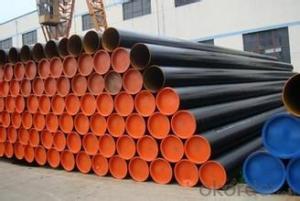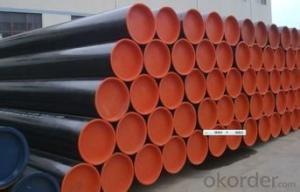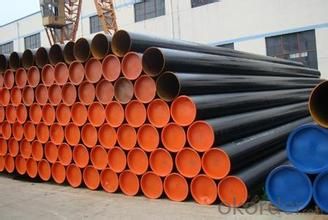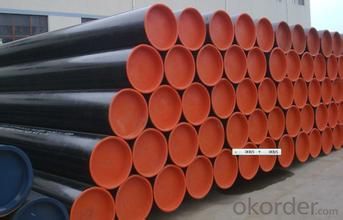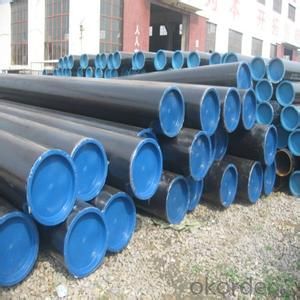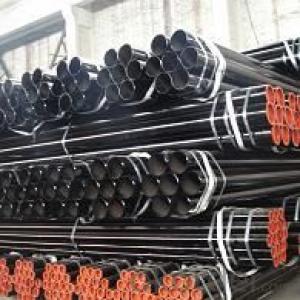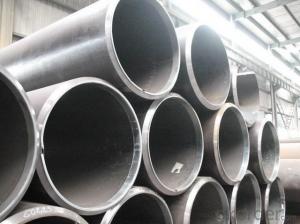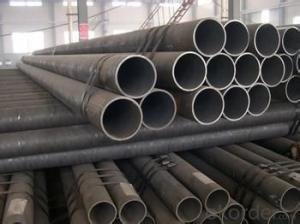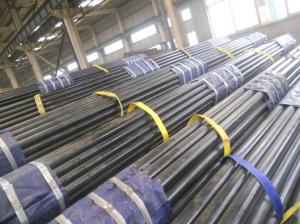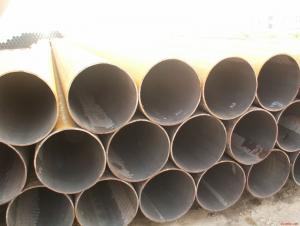Supply Seamless Steel Pipe API Certificate
- Loading Port:
- Tianjin
- Payment Terms:
- TT OR LC
- Min Order Qty:
- 30 m.t.
- Supply Capability:
- 8000 m.t./month
OKorder Service Pledge
OKorder Financial Service
You Might Also Like
1、Structure of Supply Seamless Steel Pipe API Certificate
Seamless pipe is formed by drawing a solid billet over a piercing rod to create the hollow shell. As the manufacturing process does not include any welding, seamless pipes are perceived to be stronger and more reliable. Historically seamless pipe was regarded as withstanding pressure better than other types, and was often more easily available than welded pipe.
2、Main Features of Supply Seamless Steel Pipe API Certificate
• High manufacturing accuracy
• High strength
• Strong heat dissipation ability
• Good visual effect
• Reasonable price
• Small inertia resistance
3、Supply Seamless Steel Pipe API Certificate Specification:
Standard | GB, DIN, ASTM ASTM A106-2006, ASTM A53-2007 |
Grade | 10#-45#, 16Mn 10#, 20#, 45#, 16Mn |
Thickness | 8 - 33 mm |
Section Shape | Round |
Outer Diameter | 133 - 219 mm |
Place of Origin | Shandong, China (Mainland) |
Secondary Or Not | Non-secondary |
Application | Hydraulic Pipe |
Technique | Cold Drawn |
Certification | API |
Surface Treatment | factory state or painted black |
Special Pipe | API Pipe |
Alloy Or Not | Non-alloy |
Length | 5-12M |
Outer Diameter | 21.3-610mm |
Grade | 20#, 45#, Q345, API J55, API K55, API L80, API N80, API P110, A53B |
Standard | ASME, ASTM |
1) Material:20#(ASTM A 106/A53 GRB.API5LGRB,GB),45#,16Mn,10#.
2) Specification range:OD:21.3-610mm,WT:6-70mm,length:6-12m or according to the requirement of clients.
3) Excutive standards:GB,ASME API5L.ASTM A 106/A53,Despite of the above standards,we can also supply seamless steel pipe with standard of DIN,JIS,and so on,and also develop new products according to the requirements of our clients!
4) Surface:black lacquered,varnish coating or galvanized.
5) Ends:Beveled or square cut,plastic capped,painted.
6) Packing:bundles wrapped with strong steel strip,seaworthy packing.
4、Packaging & Delivery
Packaging Details: | seaworthy package,bundles wrapped with strong steel strip |
Delivery Detail: | 15-30days after received 30%TT |
5、FAQ of Supply Seamless Steel Pipe API Certificate
①How is the quality of your products?
Our products are manufactured strictly according to national and internaional standard, and we take a test
on every pipe before delivered out. If you want see our quality certifications and all kinds of testing report, please just ask us for it.
Guaranteed: If products’ quality don’t accord to discription as we give or the promise before you place order, we promise 100% refund.
②How about price?
Yes, we are factory and be able to give you lowest price below market one, and we have a policy that “ for saving time and absolutely honest business attitude, we quote as lowest as possible for any customer, and discount can be given according to quantity”,if you like bargain and factory price is not low enough as you think, just don’t waste your time.Please trust the quotation we would give you, it is professional one.
③Why should you chose us?
Chose happens because of quality, then price, We can give you both.Additionally, we can also offer professional products inquiry, products knowledge train(for agents), smooth goods delivery, exellent customer solution proposals.Our service formula: good quality+good price+good service=customer’s trust
SGS test is available, customer inspection before shipping is welcome, third party inspection is no problem.
6、Supply Seamless Steel Pipe API Certificate Images:
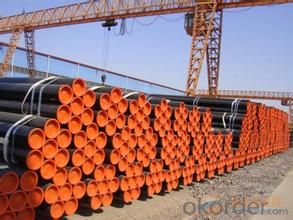
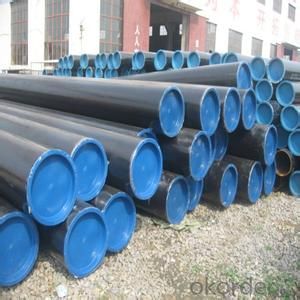
- Q: How do steel pipes withstand pressure?
- Steel pipes withstand pressure due to their inherent strength and resilience. The high tensile strength and durability of steel allow it to withstand the internal pressure exerted by fluids or gases flowing through the pipes. Additionally, the thick walls and cylindrical shape of the steel pipes distribute the pressure evenly, preventing any deformation or rupture. The seamless construction of steel pipes further enhances their ability to withstand pressure, making them a reliable choice for various applications in industries such as oil and gas, plumbing, and construction.
- Q: What is the thermal conductivity of steel pipes?
- The specific type of steel used and its composition can cause variations in the thermal conductivity of steel pipes. On average, the thermal conductivity of steel pipes ranges between 50-60 watts per meter-kelvin (W/mK). This indicates that steel pipes possess a relatively high ability to conduct heat, facilitating efficient thermal energy transfer. Given their high thermal conductivity, steel pipes find suitability in numerous applications such as heating systems, industrial processes, and infrastructure projects where heat transfer plays a crucial role.
- Q: What are the different types of steel pipe end connections?
- There are several types of steel pipe end connections, including threaded, welded, flanged, grooved, and compression fittings.
- Q: Are steel pipes suitable for use in acidic environments?
- No, steel pipes are generally not suitable for use in acidic environments because they are prone to corrosion in such conditions.
- Q: Where is the difference between seamless steel pipe and welded pipe?
- Seamless pipe pressure is higher, welded pipe is generally in 10 or so MPa, now welded pipe to do seamless processing.
- Q: How are steel pipes used in the shipbuilding industry?
- Steel pipes are commonly used in the shipbuilding industry for various applications such as the construction of the ship's hull, piping systems for fuel, water, and other fluids, as well as for the ventilation and drainage systems on board. These pipes provide strength, durability, and corrosion resistance, making them ideal for withstanding the harsh marine environment.
- Q: What are the different pressure ratings for steel pipes?
- Steel pipes have varying pressure ratings to indicate their maximum safe handling pressure. The pressure ratings of steel pipes can differ based on factors like pipe diameter, wall thickness, and material grade. Common pressure ratings for steel pipes are as follows: 1. Schedule 40: This is the standard pressure rating for general applications. It is suitable for low to medium pressure systems, with a maximum working pressure of 150 psi. 2. Schedule 80: Used for higher pressure requirements, it has a thicker wall thickness compared to Schedule 40, enabling it to handle working pressures of up to 300 psi. 3. Schedule 160: This heavy-duty pressure rating is for high-pressure applications. It has an even thicker wall thickness than Schedule 80 and can handle working pressures of up to 500 psi. In addition to these standard pressure ratings, there are specialized steel pipes available with higher pressure ratings, such as Extra Strong (XS) and Double Extra Strong (XXS). These pipes are designed for extremely high-pressure systems and have thicker walls than Schedule 160. It's important to note that the pressure ratings mentioned above specifically apply to steel pipes. Pressure ratings may vary for pipes made from other materials, such as copper or PVC. When selecting a steel pipe, it is crucial to consider the required pressure rating based on the specific application and system requirements to ensure safe and efficient operation.
- Q: Can steel pipes be used for structural purposes?
- Yes, steel pipes can be used for structural purposes.
- Q: How are steel pipes used in the construction of power plants?
- Steel pipes are widely used in the construction of power plants as they serve multiple purposes. They are primarily used for transporting various fluids, such as water, steam, and fuel, throughout the plant. Steel pipes are also used for the construction of boilers, heat exchangers, and condensers, which are essential components in power generation. Additionally, steel pipes are utilized in the construction of cooling systems, air ventilation systems, and structural supports within power plants. Overall, steel pipes are crucial for the efficient and reliable operation of power plants.
- Q: Are steel pipes suitable for food processing facilities?
- Yes, steel pipes are suitable for food processing facilities. Steel pipes are widely used in the food processing industry due to their numerous benefits. Firstly, steel pipes are highly durable and can withstand high temperatures, pressures, and corrosive substances often used in food processing. This ensures the pipes will not degrade or contaminate the food products. Additionally, steel pipes are easy to clean and maintain, making them ideal for maintaining high levels of hygiene required in food processing facilities. Steel pipes also have excellent resistance to bacteria growth, further ensuring the safety and quality of the food being processed. Furthermore, steel pipes are cost-effective and have a long lifespan, making them a reliable and economical choice for food processing facilities. Overall, steel pipes are a suitable and preferred option for food processing facilities due to their durability, cleanliness, and resistance to contamination.
Send your message to us
Supply Seamless Steel Pipe API Certificate
- Loading Port:
- Tianjin
- Payment Terms:
- TT OR LC
- Min Order Qty:
- 30 m.t.
- Supply Capability:
- 8000 m.t./month
OKorder Service Pledge
OKorder Financial Service
Similar products
Hot products
Hot Searches
Related keywords
